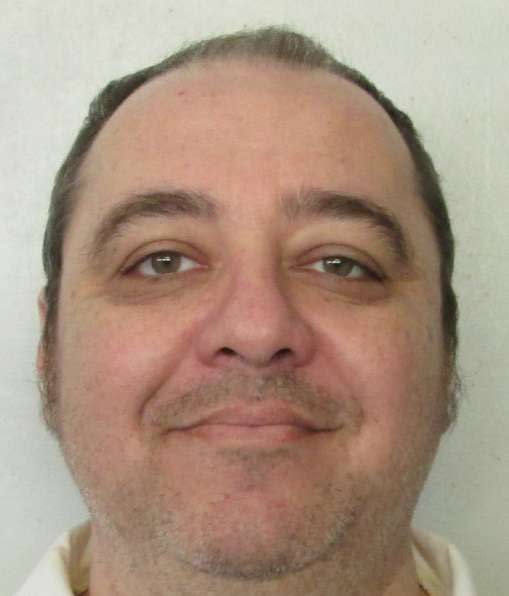Alabama plans to execute Kenneth Smith on Thursday for 1988 contract murder of preacher's wife
Alabama plans to execute Kenneth Eugene Smith, convicted of a 1988 murder for hire, by lethal injection on Thursday at 6 p.m. His attorneys will argue the appeal of his death penalty case before the U.S. Eleventh Circuit Court on Wednesday afternoon.
Smith, 57, was 22 when Elizabeth Dorlene Sennett was beaten and stabbed to death in Colbert County. Prosecutors said Sennett's husband, debt-ridden preacher Charles Sennett, was behind the contract killing, which involved Smith and two other men.
Prosecutors say Charles Sennett contacted Billy Gray Williams, one of his tenants, about killing his wife so he could collect insurance payments to pay off debts. Williams hired John Forrest Parker and Smith, paying them $1,000 each to carry out the killing while pocketing $1,000 for himself, according to prosecutors.
Charles Sennett died by suicide a week after his wife was killed.
A jury voted 11-1 to sentence Smith to life in prison without parole, but a judge overrode the jury’s decision and sentenced Smith to death in 1996.
The Equal Justice Initiative reported that Alabama has not executed anyone whose death sentence was determined by judicial override of a jury's life-sentence verdict since the state in 2017 abolished the practice.

Smith sued the state on Aug. 18, alleging that the Alabama Department of Corrections “has no protocol for [executing Smith] without subjecting [Smith] to an intolerable risk of torture, cruelty, or substantial pain,” based on prior executions and execution attempts where the state may have deviated from their execution protocols. Smith sought an injunction against his execution by lethal injection.
Smith cited the July 28 execution of Joe Nathan James, Jr., which came after a three-hour delay as prison officials struggled to set an intravenous line for the lethal injection. A later version of Smith’s complaint also cites Alabama’s attempt to execute Alan Eugene Miller on Sept. 22, which it called off as midnight approached without successfully establishing necessary IV lines.
Smith also claimed that the state violated his due process rights by not being given necessary information to make an informed decision about his right to choose death by nitrogen hypoxia rather than lethal injection. After Alabama approved the untested method as an alternative way to carry out the death penalty, it reportedly gave those on death row 30 days to elect nitrogen hypoxia in writing.
Smith said that had he known that Alabama would still not have an execution protocol for nitrogen hypoxia in place more than four years later, he would have chosen to be executed by nitrogen.
U.S. District Judge R. Austin Huffaker, Jr., dismissed Smith’s case on Oct. 16. Smith filed a motion for a new judgment, which Huffaker dismissed shortly after. Huffaker wrote that alleged violations of the state’s execution protocol don’t necessarily mean an execution was unconstitutional.

“Just because the ADOC allegedly violated some aspect of the protocol does not mean that an Eighth Amendment violation resulted from the ADOC’s actions,” Huffaker wrote.
However, Huffaker warned the ADOC to strictly adhere to its protocol, specifically instructing the state to not perform a “cutdown” or deliver an intramuscular sedative to Smith.
Reports emerged that ADOC may have performed a cutdown on James after reporter Elizabeth Bruenig wrote an article published in the Atlantic describing what she saw at a private autopsy of James’ body. Boris Datnow, the Birmingham pathologist who carried out the private autopsy, has since said he found no evidence of a cutdown on James’ body.
The ADOC denied sedating James but could not confirm that he was fully conscious in the minutes before the lethal dose began to flow. James did not open his eyes as he laid on the gurney and did not respond to the warden’s request for his final words.
Smith appealed his case to the Eleventh Circuit last Thursday, one week before his scheduled execution. Smith’s attorneys and attorneys for the state will present oral arguments to a three-judge panel at in Atlanta at 1:30 p.m. CT Wednesday. Judges Charles Wilson, Jill Pryor and Britt Grant are expected to hear arguments.
Alabama has already executed Parker, the other man accused of killing Sennett. Parker died by lethal injection in 2010. Williams, who recruited Parker and Smith to kill Elizabeth Sennett, was sentenced to life without the possibility of parole for his role in the killing. Williams no longer appears on ADOC’s website.
Evan Mealins is the justice reporter for the Montgomery Advertiser. Contact him at emealins@gannett.com or follow him on Twitter @EvanMealins.
Your subscription makes our journalism possible. Subscribe today.
This article originally appeared on Montgomery Advertiser: Alabama to execute Kenneth Eugene Smith via lethal injection

